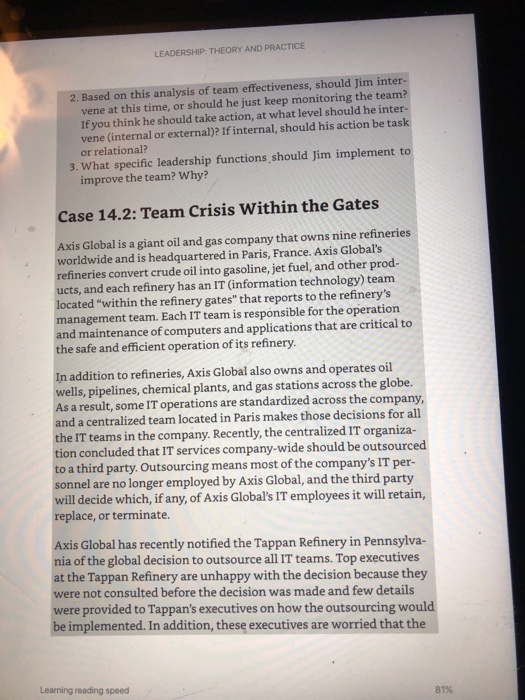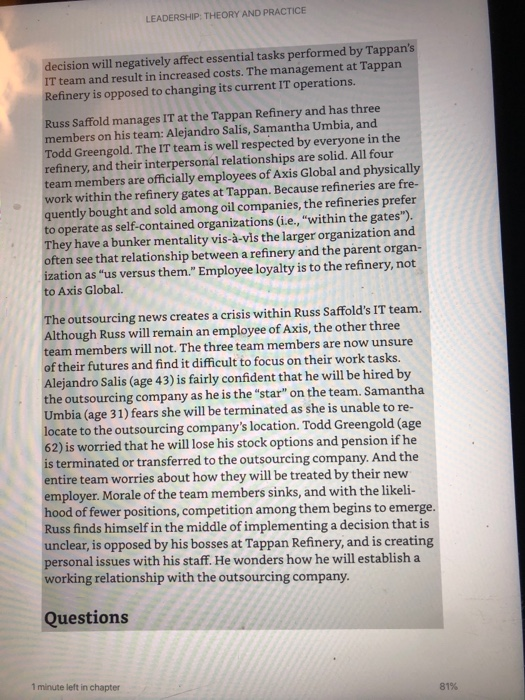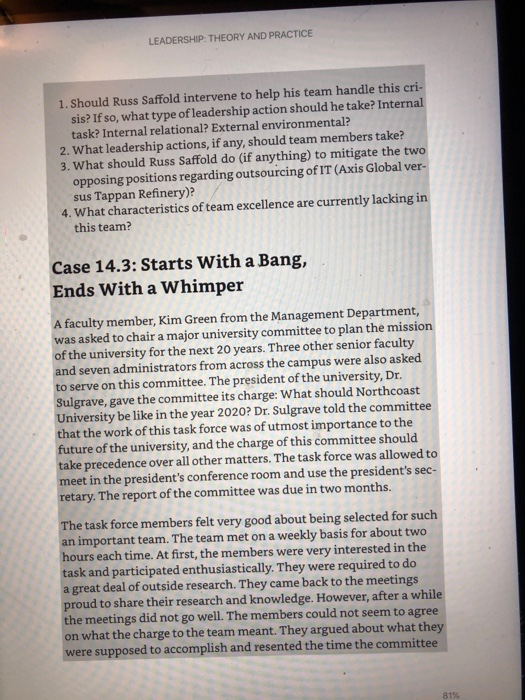case 14.2 questions 1-4

LEADERSHIP THEORY AND PRACTICE 2. Based on this analysis of team effectiveness, should Jim inter vene at this time, or should he just keep monitoring the team? If you think he should take action, at what level should he inter- vene (internal or external)? If internal, should his action be task or relational? 3. What specific leadership functions should Jim implement to improve the team? Why? Case 14.2: Team Crisis Within the Gates Axis Global is a giant oil and gas company that owns nine refineries worldwide and is headquartered in Paris, France. Axis Global's refineries convert crude oil into gasoline, jet fuel, and other prod. ucts, and each refinery has an IT (information technology) team located within the refinery gates" that reports to the refinery's management team. Each IT team is responsible for the operation and maintenance of computers and applications that are critical to the safe and efficient operation of its refinery. In addition to refineries, Axis Global also owns and operates oil wells, pipelines, chemical plants, and gas stations across the globe. As a result, some IT operations are standardized across the company, and a centralized team located in Paris makes those decisions for all the IT teams in the company. Recently, the centralized IT organiza- tion concluded that IT services company-wide should be outsourced to a third party. Outsourcing means most of the company's IT per- sonnel are no longer employed by Axis Global, and the third party will decide which, if any, of Axis Global's IT employees it will retain, replace, or terminate Axis Global has recently notified the Tappan Refinery in Pennsylva- nia of the global decision to outsource all IT teams. Top executives at the Tappan Refinery are unhappy with the decision because they were not consulted before the decision was made and few details were provided to Tappan's executives on how the outsourcing would be implemented. In addition, these executives are worried that the Learning reading speed 81% LEADERSHIP: THEORY AND PRACTICE decision will negatively affect essential tasks performed by Tappan's IT team and result in increased costs. The management at Tappan Refinery is opposed to changing its current IT operations. Russ Saffold manages IT at the Tappan Refinery and has three members on his team: Alejandro Salis, Samantha Umbia, and Todd Greengold. The IT team is well respected by everyone in the refinery, and their interpersonal relationships are solid. All four team members are officially employees of Axis Global and physically work within the refinery gates at Tappan. Because refineries are fre- quently bought and sold among oil companies, the refineries prefer to operate as self-contained organizations (i.e., "within the gates"). They have a bunker mentality vis--vis the larger organization and often see that relationship between a refinery and the parent organ- ization as "us versus them." Employee loyalty is to the refinery, not to Axis Global The outsourcing news creates a crisis within Russ Saffold's IT team. Although Russ will remain an employee of Axis, the other three team members will not. The three team members are now unsure of their futures and find it difficult to focus on their work tasks. Alejandro Salis (age 43) is fairly confident that he will be hired by the outsourcing company as he is the "star" on the team. Samantha Umbia (age 31) fears she will be terminated as she is unable to re- locate to the outsourcing company's location. Todd Greengold (age 62) is worried that he will lose his stock options and pension if he is terminated or transferred to the outsourcing company. And the entire team worries about how they will be treated by their new employer. Morale of the team members sinks, and with the likeli- hood of fewer positions, competition among them begins to emerge. Russ finds himself in the middle of implementing a decision that is unclear, is opposed by his bosses at Tappan Refinery, and is creating personal issues with his staff. He wonders how he will establish a working relationship with the outsourcing company. Questions 1 minute left in chapter LEADERSHIP: THEORY AND PRACTICE 1. Should Russ Saffold intervene to help his team handle this cri- sis? If so, what type of leadership action should he take? Internal task? Internal relational? External environmental? 2. What leadership actions, if any, should team members take? 3. What should Russ Saffold do (if anything) to mitigate the two opposing positions regarding outsourcing of IT (Axis Global ver- sus Tappan Refinery)? 4. What characteristics of team excellence are currently lacking in this team? Case 14.3: Starts with a Bang, Ends With a whimper A faculty member, Kim Green from the Management Department, was asked to chair a major university committee to plan the mission of the university for the next 20 years. Three other senior faculty and seven administrators from across the campus were also asked to serve on this committee. The president of the university, Dr. Sulgrave, gave the committee its charge: What should Northcoast University be like in the year 2020? Dr. Sulgrave told the committee that the work of this task force was of utmost importance to the future of the university, and the charge of this committee should take precedence over all other matters. The task force was allowed to meet in the president's conference room and use the president's sec- retary. The report of the committee was due in two months. The task force members felt very good about being selected for such an important team. The team met on a weekly basis for about two hours each time. At first, the members were very interested in the task and participated enthusiastically. They were required to do a great deal of outside research. They came back to the meetings proud to share their research and knowledge. However, after a while the meetings did not go well. The members could not seem to agree on what the charge to the team meant. They argued about what they were supposed to accomplish and resented the time the committee 81% LEADERSHIP THEORY AND PRACTICE 2. Based on this analysis of team effectiveness, should Jim inter vene at this time, or should he just keep monitoring the team? If you think he should take action, at what level should he inter- vene (internal or external)? If internal, should his action be task or relational? 3. What specific leadership functions should Jim implement to improve the team? Why? Case 14.2: Team Crisis Within the Gates Axis Global is a giant oil and gas company that owns nine refineries worldwide and is headquartered in Paris, France. Axis Global's refineries convert crude oil into gasoline, jet fuel, and other prod. ucts, and each refinery has an IT (information technology) team located within the refinery gates" that reports to the refinery's management team. Each IT team is responsible for the operation and maintenance of computers and applications that are critical to the safe and efficient operation of its refinery. In addition to refineries, Axis Global also owns and operates oil wells, pipelines, chemical plants, and gas stations across the globe. As a result, some IT operations are standardized across the company, and a centralized team located in Paris makes those decisions for all the IT teams in the company. Recently, the centralized IT organiza- tion concluded that IT services company-wide should be outsourced to a third party. Outsourcing means most of the company's IT per- sonnel are no longer employed by Axis Global, and the third party will decide which, if any, of Axis Global's IT employees it will retain, replace, or terminate Axis Global has recently notified the Tappan Refinery in Pennsylva- nia of the global decision to outsource all IT teams. Top executives at the Tappan Refinery are unhappy with the decision because they were not consulted before the decision was made and few details were provided to Tappan's executives on how the outsourcing would be implemented. In addition, these executives are worried that the Learning reading speed 81% LEADERSHIP: THEORY AND PRACTICE decision will negatively affect essential tasks performed by Tappan's IT team and result in increased costs. The management at Tappan Refinery is opposed to changing its current IT operations. Russ Saffold manages IT at the Tappan Refinery and has three members on his team: Alejandro Salis, Samantha Umbia, and Todd Greengold. The IT team is well respected by everyone in the refinery, and their interpersonal relationships are solid. All four team members are officially employees of Axis Global and physically work within the refinery gates at Tappan. Because refineries are fre- quently bought and sold among oil companies, the refineries prefer to operate as self-contained organizations (i.e., "within the gates"). They have a bunker mentality vis--vis the larger organization and often see that relationship between a refinery and the parent organ- ization as "us versus them." Employee loyalty is to the refinery, not to Axis Global The outsourcing news creates a crisis within Russ Saffold's IT team. Although Russ will remain an employee of Axis, the other three team members will not. The three team members are now unsure of their futures and find it difficult to focus on their work tasks. Alejandro Salis (age 43) is fairly confident that he will be hired by the outsourcing company as he is the "star" on the team. Samantha Umbia (age 31) fears she will be terminated as she is unable to re- locate to the outsourcing company's location. Todd Greengold (age 62) is worried that he will lose his stock options and pension if he is terminated or transferred to the outsourcing company. And the entire team worries about how they will be treated by their new employer. Morale of the team members sinks, and with the likeli- hood of fewer positions, competition among them begins to emerge. Russ finds himself in the middle of implementing a decision that is unclear, is opposed by his bosses at Tappan Refinery, and is creating personal issues with his staff. He wonders how he will establish a working relationship with the outsourcing company. Questions 1 minute left in chapter LEADERSHIP: THEORY AND PRACTICE 1. Should Russ Saffold intervene to help his team handle this cri- sis? If so, what type of leadership action should he take? Internal task? Internal relational? External environmental? 2. What leadership actions, if any, should team members take? 3. What should Russ Saffold do (if anything) to mitigate the two opposing positions regarding outsourcing of IT (Axis Global ver- sus Tappan Refinery)? 4. What characteristics of team excellence are currently lacking in this team? Case 14.3: Starts with a Bang, Ends With a whimper A faculty member, Kim Green from the Management Department, was asked to chair a major university committee to plan the mission of the university for the next 20 years. Three other senior faculty and seven administrators from across the campus were also asked to serve on this committee. The president of the university, Dr. Sulgrave, gave the committee its charge: What should Northcoast University be like in the year 2020? Dr. Sulgrave told the committee that the work of this task force was of utmost importance to the future of the university, and the charge of this committee should take precedence over all other matters. The task force was allowed to meet in the president's conference room and use the president's sec- retary. The report of the committee was due in two months. The task force members felt very good about being selected for such an important team. The team met on a weekly basis for about two hours each time. At first, the members were very interested in the task and participated enthusiastically. They were required to do a great deal of outside research. They came back to the meetings proud to share their research and knowledge. However, after a while the meetings did not go well. The members could not seem to agree on what the charge to the team meant. They argued about what they were supposed to accomplish and resented the time the committee 81%










